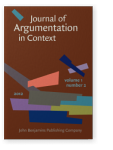Vol. 1:2 (2012) ► pp.194–208
Differences in actual persuasiveness between experiential and professional expert evidence
This study investigates the persuasiveness of different types of expert evidence. Following Wagemans (2011), two types of experts were distinguished that can be used in expert evidence: experiential experts (who base their expertise on personal experience) and professional experts (who base their expertise on professional knowledge). In a between-subjects experiment (N = 179), these different types of experts were included in a news report on a political issue. Results indicate that the perceived expertise and persuasiveness of professional experts was higher than that of experiential experts. Perceived expertise completely mediated the effects of the different types of expert evidence on persuasion. These results point towards a recommendation of using professional expert evidence over experiential expert evidence in reporting on political issues.
Cited by (2)
Cited by 2 other publications
This list is based on CrossRef data as of 4 july 2024. Please note that it may not be complete. Sources presented here have been supplied by the respective publishers. Any errors therein should be reported to them.
